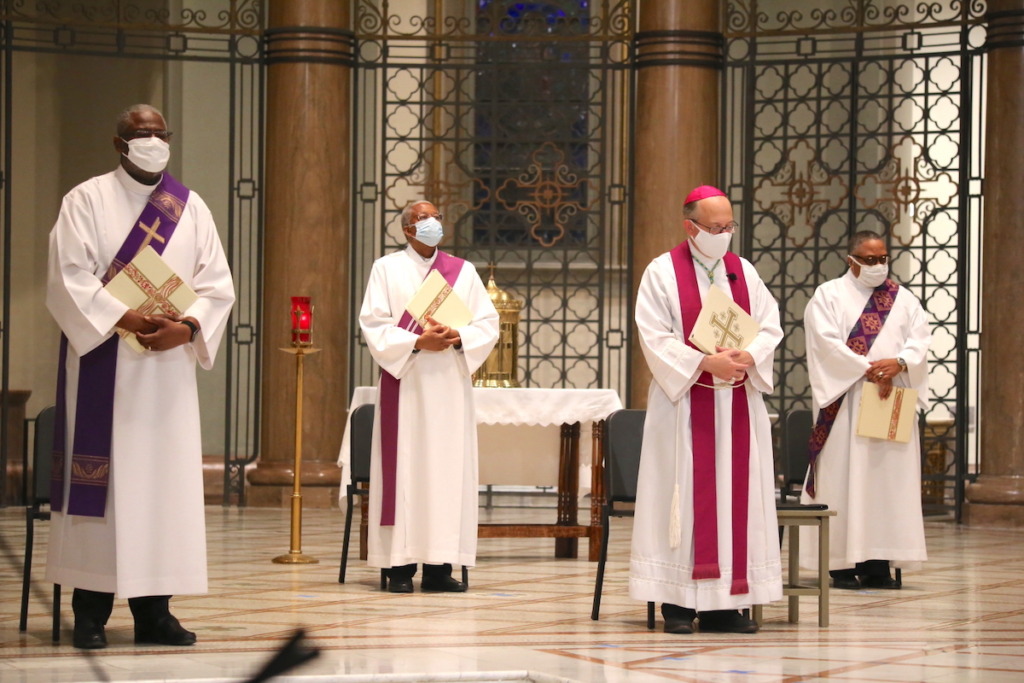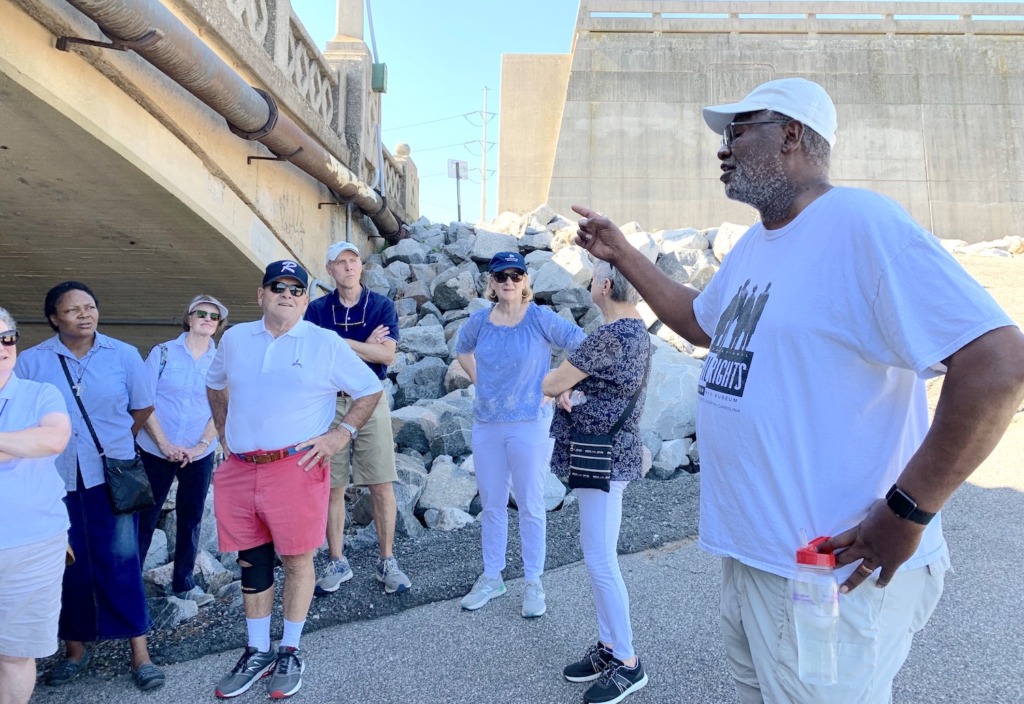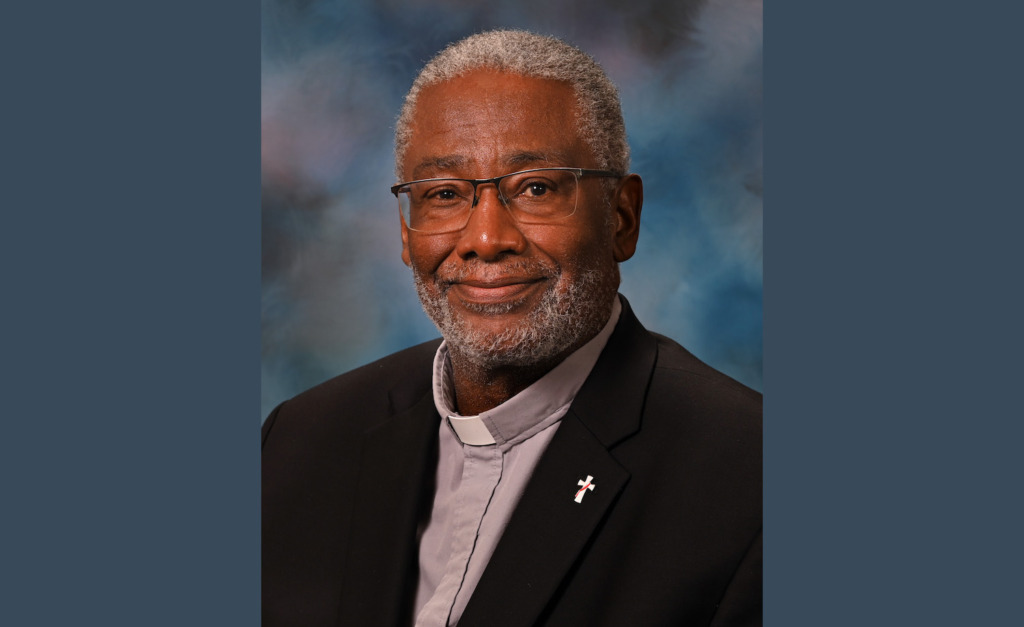Deacon Williams remembered as compassionate, spiritually deep
It was 1994. The son of a friend had a daughter who was receiving her first Communion at St. Paul Church, Richmond, and he invited Charles Williams to attend. Williams had been away from the Catholic Church since 1969, angry that the Diocese of Richmond closed his parish, St. Joseph, Richmond. But he agreed to come to the first Communion Mass.
And then?
“The Holy Spirit took hold of him. He came flooding back to the Church, and when he came back, he came back full speed,” said Deacon John Tucker, relating how Deacon Charles Williams would describe his own spiritual journey.
Deacon Tucker, who met Deacon Williams shortly after his return to the Church, was the homilist at the Mass of Christian Burial for him on Friday, Feb. 4 at the Cathedral of the Sacred Heart. Deacon Williams, 70, a native Richmonder from Jackson Ward, passed away on Thursday, Jan. 27.
“He told me a year or so ago, ‘If I don’t wake up tomorrow, I’m prepared to go,’” Deacon Tucker said. “He was a man of unshakeable faith. Even in his last hours, he told me, ‘These doctors tell me, I’m nearing the end. If so, I’m OK with that.’”
When Deacon Tucker, who serves at St. Paul Parish, spoke with The Catholic Virginian on Tuesday, Feb. 1, he was still gathering his thoughts for what he would say in his homily.
“I want to give people a sense of the man and his journey in his life,” he said. “Charles came full circle with the Church.”
That “full circle,” according to Deacon Tucker, is what his diaconate formation classmate would describe as his “mutual reconciliation” with the Church.
“He forgave the Church for what, in his perception, they had done to his childhood parish. In turn, the Church and God had forgiven him for being away,” Deacon Tucker said.
Noting Deacon Williams’ “tall, commanding presence,” Deacon Tucker said that people naturally gravitated toward him.
“He got a lot of requests to do many things. He needed to learn how to say no,” Deacon Tucker said with a laugh.
He said he was still processing the loss of his diaconate formation classmate. Both began the program in 2007. Deacon Tucker was ordained at the cathedral in fall 2012; Deacon Williams at St. Paul in summer 2013.
“We had a standing lunch date on Mondays for the last 20 years,” Deacon Tucker said of the personal bond between the two. “This is a big blow to me. I have lost my best friend and confidant.”
‘Led by the Holy Spirit’
Deacon Francis “Frank” Nelson Jr., who serves at Holy Rosary Parish, Richmond, spoke of the “brother relationship” he had with Deacon Williams, whom he had met prior to their applying for diaconate formation.
“We seemed to connect very quickly and easily during formation. Out of that relationship, we were a support for each other. He was such a brother to me in my journey as a man and as a deacon,” he said, adding, “He always came across as a faith-filled, Christian man. Whatever he took on, he was convicted to it. He was always committed to it.”
Deacon Nelson, who served in prison ministry with Deacon Williams, said his friend, although tall, was not intimidating.
“He had a voice that was unmistakable. He just had a gift to connect. He was very welcoming,” he said.
Deacon Nelson noted that Deacon Williams’ participation on numerous boards and committees, e.g., Hope in the Cities, the Virginia Center for Inclusive Communities, Racial Reconciliation and All Saints Catholic School, to name a few, were one of the ways he evangelized.
“Charles was led by the Holy Spirit to do God’s will by participating in various organizations,” he said.
A counselor by profession, Deacon Nelson said he is still “numb” from the loss of his friend. “I’m used to dealing with people who have suffered a loss,” he said. “People are grieving. We’re all grieving the loss of him.”
Healing wounds
Already steeped in ministries at the Cathedral of the Sacred Heart and beyond, Deacon Williams’ outreach expanded when Bishop Barry C. Knestout appointed him to head the diocesan Office for Black Catholics on Dec. 3, 2018.

In a Dec. 6, 2018, interview with The Catholic Virginian, Deacon Williams recalled that the bishop had asked to meet with Deacon Nelson and him to discuss the Office for Black Catholics after the office’s previous director, Pam Harris, had left to take a job in another diocese, and Comboni Missionary Sister Inma Cuesta-Ventura, director of the diocese’s Office of Hispanic Ministry, was given the responsibility of overseeing the Office for Black Catholics.
Deacon Williams said he was hoping the bishop would hear what he had to say about the office — that it remain as it had been since it was established in 1980 — separate and with its own director and not part of another office.
“I understood that was the trend in other dioceses around the country, that they rolled all the ethnic offices (into one),” the deacon said. “But my spirit told me that was not the right thing to do for the Office for Black Catholics in the Diocese of Richmond.”
Deacon Williams said that he did not seek the directorship, nor did he ask for it.
“In my mind, it’s got to be from God. God spoke through the bishop; I did not see this coming. All I know is I felt heard,” he said regarding the meeting with Bishop Knestout and the subsequent invitation to head the office.
Deacon Nelson recalled that he and Deacon Williams were heard.
“I truly believe the Holy Spirit was present in that meeting,” he said. “Charles expressed how he felt and continued to advocate for the Office for Black Catholics. The Holy Spirit was at work, and he was called to take that position (as head of the office).
Bishop Knestout expressed gratitude for Deacon Williams’ “service, commitment and work.”
“Deacon Charles was kind, gentle and someone who was very giving with his time. He did express in a very good and full way so many of the fruits of the Spirit, through his service as a permanent deacon, but also in his work as director for the Office for Black Catholics,” the bishop told The Catholic Virginian Feb. 1.
He noted the deacon had immersed himself in multiple ministries in the diocese.
“At times as a chaplain, or in his role advocating for prison ministry and racial healing, all of which allowed him to encounter many individuals — especially those who were hurting — to open their hearts to the Spirit and love of Christ,” Bishop Knestout said. “His tremendous love and service to our local Church reflects the life of discipleship within our Church.”

In a letter to social ministry leaders in the diocese, Rachael Laustrup, director of the Office of Social Ministries and Respect Life, noted the Slave Trail Walks that Deacon Williams led.
“I journeyed with Deacon Charles on three Slave Trail Walks, and each time I felt not only the transformative power of learning that history, but I felt how spiritual each of those walks were for him personally. They were a way for him to heal wounds and to open our eyes and our hearts to a past we cannot ignore.”
She continued, “Deacon Charles was passionate about the fight for racial justice, truth-telling and reconciliation, but he was also a man deeply rooted in his faith. He loved the Bible, prayer and being on the altar more than anything.”
Respected by deacons
According to Deacon John Kren, one of the communities upon which Deacon Williams had an impact was the permanent deacons.
“He was very well respected in the deacon community and the parish communities. His stature matched how he was involved. He was very compassionate,” said Deacon Kren, director of the diocese’s Office for the Permanent Diaconate. “Charles mentored the guys coming up.”
He recalled that Deacon Williams spoke at the deacons’ convocation in 2018 on “Spirituality and Race Relations.”
“He addressed a hard topic that was very well received,” Deacon Kren said. “He knew Black history in our diocese.”
Gerry Mancuso, registrar and coordinator for the permanent diaconate, described Deacon Williams as a “bigger than life guy — a big man with a big smile who was very invested in his ministry.”
She noted he was well respected by his brother deacons.
“Deacon Charles was a real gentle soul with a deep spirituality. He was a quiet guy, but when he spoke, people listened,” she said, adding, “This is a real loss for the diocese.”
Helping others to see
Although he considered St. Paul his parish, Deacon Williams served at the Cathedral of the Sacred from the time of his ordination — first with Msgr. Patrick Golden, who was rector until 2019, and then with Father Anthony Marques.
Msgr. Golden noted that, without knowing the deacon was dying, he had mentioned him by name in a recent homily.
“The Gospel was Jesus quoting Isaiah about opening the eyes so that the blind may see. I said Deacon Charles did so for me, helping me to see what it was like to be a Black man growing up in a once segregated city of Richmond,” the priest said. “He really opened my eyes to it, and I remember his great anguish after witnessing what took place in Charlottesville, opening wounds of the past. He was a wonderful man, and I will certainly miss him.”
Father Marques called him a “gentle giant.”
“He was always generous with his time and always willing to assist us in many ways,” the priest said.
Describing what will be Deacon Williams’ legacy and why he could reach so many people was biblical, according to Deacon Nelson.
“’We walk by faith, not by sight’ (2 Cor 5:7).” He exemplified that. Be in prayer and trust in the Lord no matter what challenges come your way,” he said.
More about Deacon Williams
Deacon Williams was predeceased by his parents, Charles Sr. and Maggie, and his brother, Tony. His brother, David, survives him. In 1977, Deacon Williams married Gloria Iverson, and of that union was born a son, Charles III (Chuck), whose family includes Lauren and Charles IV (Moose).
Deacon Williams is also survived by his wife, Marie, and her children, Geneva and Olivia (Anna) Manion. He was educated at Van De Vyver and Benedictine Catholic Schools, Howard University and St. Leo University. He was a Cursillista since 2002.
Deacon Williams worked for Dominion Power in the Data Center for nearly 30 years. Upon retirement, he lived and worked at Richmond Hill, then Blessed Sacrament-Huguenot Catholic School, and Boaz & Ruth, followed by a fulfilling ministry for Bliley’s Funeral Homes.

